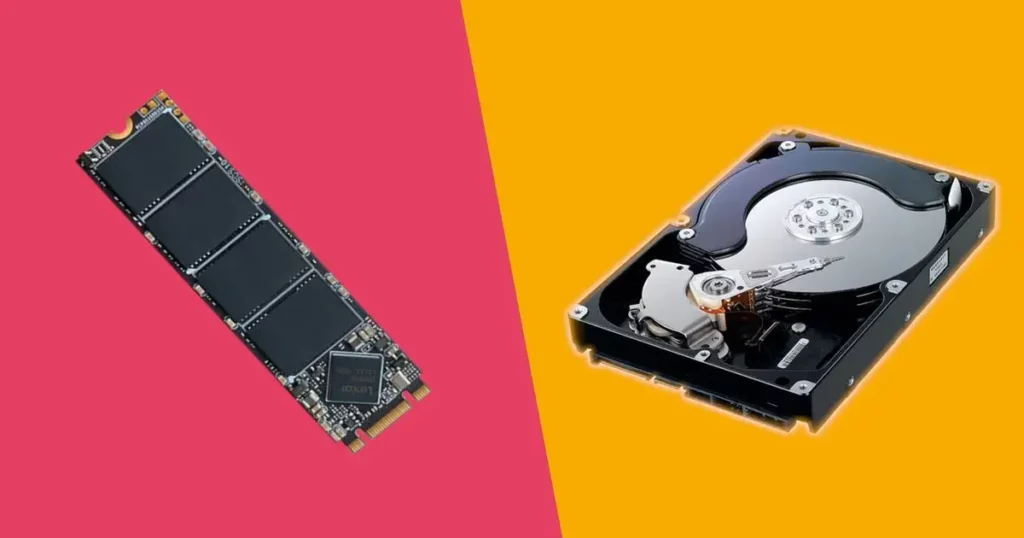Is your laptop slow or running out of space? It might be time to buy a new one. You can pick a less expensive hard disk drive (HDD) or a quicker solid-state drive (SSD). We’ll look at how they differ in speed, how much they can hold, their cost, and how long they last. Also, think about getting special software to help keep your computer clean and running smoothly.
Both have good points, but they work differently. Here’s a straightforward guide to help you decide which one is right for you.
What’s the Difference?
- SSD: This is a newer type of storage that’s fast. It makes your laptop start up quickly and open programs in a snap. Because it doesn’t have any moving parts, it’s also more likely to survive if you drop your laptop.
- HDD: This is the older type of storage. It can hold a lot of stuff like your movies, music, and games, and it’s cheaper than an SSD. But it’s slower and might break more easily if you’re rough with your laptop.
SSD vs HDD: A Quick Comparison
Here is the list of some features for a quick comparison of SSD and HDD:
| Feature | SSD | HDD |
|---|---|---|
| Speed: | Significantly faster read/write speeds | Slower data access times |
| Durability: | More durable due to no moving parts | Less durable with risk of mechanical failure |
| Storage Capacity: | Generally lower than HDDs for the same cost | Higher capacities available at lower prices |
| Price: | ₹9,000 per TB | ₹4,500 per TB |
| Average lifespan: | 5 years | 5 years |
| Power Consumption: | Lower power usage leads to better battery life | Higher power consumption |
| Time to boot Windows: | 10 seconds | 4 Minutes |
| Noise and Heat: | Silent operation and lower heat generation | Generates noise and heat |
| GTA V Loading Time: | 25 seconds | 2 minutes (Approx) |
Pros and Cons of SSDs and HDDs
Deciding between an SSD and a hard drive for your new computer mainly depends on how much you’re willing to spend. SSDs tend to cost more, but they offer faster access to big files repeatedly. On the other hand, HDDs are more affordable and are suitable for users with average computing needs.
Let’s explore the advantages and disadvantages of each—SSD vs HDD:
| SSD | HDD |
|---|---|
| Faster | Slower |
| More Expensive | Cheaper |
| Non-mechanical | Mechanical |
| Shock-resistant | Fragile |
Which is Faster?
SSDs (Solid State Drives) are quicker than HDDs (Hard Disk Drives) because of how they work. SSDs use a special kind of memory that lets them get to and move data fast. This means computers with SSDs start up quicker, open apps faster, and are generally speedier.
HDDs use moving parts to find and save data, which is slower. Because SSDs can do things faster and don’t have moving parts, they are better for tasks where speed is important. Here are some key points and statistics to illustrate the difference:
- Read/Write Speeds: SSDs can offer read/write speeds from about 500 MB/s to 5500 MB/s or more, depending on the interface (e.g., SATA III, NVMe over PCIe 4.0). In contrast, a typical HDD might offer read/write speeds in the range of 80 MB/s to 160 MB/s. This means SSDs can be up to several times faster than HDDs in data transfer rates.
- Access Times: SSDs have access times of around 0.1 milliseconds (ms) compared to HDDs, which have access times ranging from 5 to 10 ms. This faster access time makes SSDs much quicker in retrieving data.
- Boot Times: Computers with SSDs can boot in as little as 10 to 13 seconds, while systems with HDDs might take 30 to 40 seconds or more.
- Application Performance: Applications and games load significantly faster on SSDs. For example, a game that takes 20 seconds to load on an HDD might load in just a few seconds on an SSD.
- Durability and Reliability: SSDs, lacking moving parts, are more resistant to physical shock and run silently, whereas HDDs are susceptible to damage due to their mechanical parts.
- Energy Efficiency: SSDs are more energy-efficient than HDDs. An SSD typically consumes 2 to 3 watts, compared to 6 to 7 watts for an HDD, which can have a noticeable impact on the battery life of laptops.
So, SSDs are much faster and better in many ways, but they can cost more than HDDs. Whether you should get an SSD or HDD depends on what you need, like how fast you want your computer to be, how much you want to spend, and how much storage you need.
Reliability
Since SSDs don’t contain moving parts, they are less likely to break if you drop or hit your computer. This makes them more trustworthy, especially when it’s very hot or very cold. Usually, an SSD can last just as long as an HDD, if not longer.
SDDs fare better than HDDs in laptops because they’re portable, it’s not as easy to damage them when you’re carrying your laptop around.
You can use a tool like Windows CHKDSK to check an SSD without harming it. This tool skips over the bad parts of the SSD that don’t work anymore. But, you shouldn’t try to defrag (reorganize) an SSD. Doing that writes a lot of data over and over, which can make the SSD wear out faster.
SSD vs HDD Price difference
The flash storage market is unpredictable and changes with supply and demand levels. Although the cost of SSDs has decreased significantly over time, there’s still a noticeable price gap between SSDs and HDDs. For example, a 1 TB internal HDD can be purchased for about ₹4,500, while a similar 1 TB internal SSD typically costs around ₹9,000.
Security and Data Recovery
If your storage drive stops working, you can often get back your saved data, whether it’s an HDD or an SSD. But, there are a few differences. Fixing SSDs might cost more because they are newer. However, SSDs are faster, so you might get your data back quicker than with an HDD.
SSDs have a special way of deleting files that makes it hard to get them back once they’re gone. This helps SSDs last longer but makes data recovery tricky. If you need to get back lost files from an SSD, it’s usually a job for experts with the right tools.
No matter if you have an HDD or an SSD, the best way to keep your data safe is to regularly copy it to another place, like an external drive or the internet (cloud storage).
Which is better for Gaming?
For gamers, using an SSD (Solid State Drive) instead of an HDD (Hard Disk Drive) makes a big difference. SSDs make games start and run faster because they can move data quickly. For example, a game like GTA V can load in about 25 seconds on a Samsung 970 Evo Plus SSD, but it might take more than two minutes on an old HDD.
The trend towards SSDs also moved to CES 2024 where, the latest Next-Gen Gaming Laptops were showcased, highlighting how crucial SSDs have become in providing top-notch gaming experiences on portable devices as well.
Moreover, new gaming consoles like the PlayStation 5 and Xbox Series X use SSDs. This adoption by major console manufacturers indicates that game developers are now optimizing their creations for SSDs, ensuring games can quickly load large files. Whether you’re building a gaming PC, upgrading, or selecting a new gaming laptop, opting for an SSD is a wise choice for enhanced performance and smoother gaming experiences.
How to Choose?
The choice between SSD vs HDD for your next laptop should be influenced by several factors:
- Performance Needs: If you require high-speed performance for gaming, video editing, or software development, an SSD is the way to go.
- Storage Requirements: For users with large media collections or who work with extensive data sets, the higher storage capacity of an HDD may be more appealing.
- Budget Constraints: If cost is a primary concern, HDDs offer more storage for your dollar. However, it’s worth considering that an SSD could offer better value in the long run through improved durability and lower power consumption.
- Mobility: For those who travel frequently or use their laptop in various settings, the robustness and lower power consumption of an SSD can be particularly beneficial.
Can’t Decide? Get Both!
Some laptops let you have both an SSD and an HDD. This way, you get the best of both worlds: speed from the SSD for your programs and lots of storage from the HDD for your files.
Future Trends in the Market
More and more laptops now come with SSDs because they work faster and are stronger. The great news is that SSDs are getting cheaper and can hold more stuff than before. This means you don’t have to choose between having a fast laptop or one that can hold a lot of your movies, music, and games.
You can have both! SSDs are also getting better and lasting longer, making them a smart choice for everyone. Plus, they help your laptop’s battery last longer since they don’t use as much power. This is important if you like to use your laptop away from a plug. As SSDs become more common and affordable, they are being used in all kinds of laptops, not just the really expensive ones.
This means more people can enjoy fast and reliable laptops. Even though you can still buy laptops with HDDs because they are cheap and can store a lot of your stuff, many people are starting to prefer SSDs. This change shows that soon, most laptops might just come with SSDs.
Conclusion
Choosing between an SSD and an HDD depends on what you value most: speed and toughness with SSDs, or lots of storage space and saving money with HDDs. By understanding what each one offers, you can pick the best storage option for your new laptop, making sure you get what you need.



